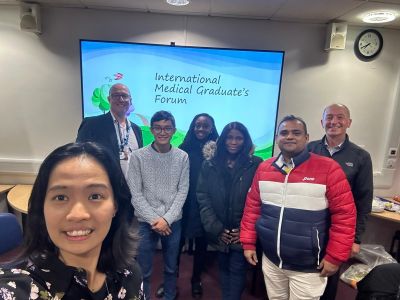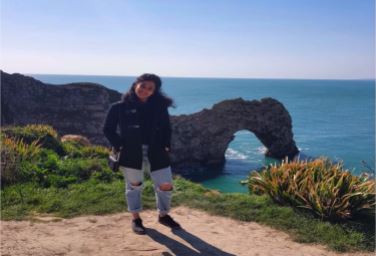International medical graduates
A really warm welcome to all of our international medical graduates.
Coming to the UK can be an exciting and challenging time. Negotiating the NHS and coming into a new health economy can be equally daunting.
This page aims to introduce you to Dorset HealthCare and a little about working within the NHS.

Working in Dorset
Dorset is a beautiful part of the UK. Situated on the south coast, Dorset offers miles of excellent and safe beaches. There are a number of large towns within Dorset, from the large and bustling towns of Poole and Bournemouth to the quiet market towns of Blandford and Shaftesbury. Dorset really has it all.
The far west of Dorset is Lyme Regis a picturesque and extremely beautiful journey along the coast from Poole and Bournemouth. The county boasts one of the largest natural harbours in the world making it the perfect place for water sports. The isles of Purbeck and Portland are home to some unique wildlife as well as some tiny and picturesque medieval villages.
Coming to the UK
In order to come to the UK you will need to have a tier 2 visa or a spouse visa. If you have been recruited by the trust, we will supply a letter of sponsorship which will allow you to apply for your visa before coming to the UK. More details can be found on the government website.
The GMC
The General Medical Council is an independent organisation which aims to improve patient safety through medical education and regulation. All doctors are required to be registered with the GMC and have a licence to practice in order to work within the UK. Details of how to apply may be found at the GMC website.
This is quite a long process and you will need to allow plenty of time in order to secure registration with the GMC. If your primary medical qualification is from outside of the UK, the European Economic Area or Switzerland, you will need to demonstrate competencies in both English language and medical knowledge . You may be required to complete 1 or more of the following competencies.
PLAB 1 and 2
Professional and linguistic board tests. The PLAB tests both professional and linguistic skills and comes in two parts. PLAB 1 is a multiple choice exam with 180 single best answer questions. Part two is a practical objective structured clinical exam known as an OSCE. Both parts of the PLAB need to be completed before you can apply for GMC registration with a licence to practice.
When you are ready to apply for GMC registration please use the following link. Apply for registration and/or licensing with us.
IELTS (International English Language Test) and the Occupational English Test (OET)
In addition to passing parts 1 and 2 of the PLAB examination, and before taking PLAB 1 and 2, you will also need to demonstrate competency in English. This can be either International English Language test. For this to be accepted you must demonstrate the following:
For IELTS:
- you took the academic version of the test
- that you got a score of 7 in each area with an overall score of 7.5
- that you received these scores in the same test
- that you got these scores on your most recent sitting of the test
- the original stamp and test report form number.
For OET:
- that you took the medicine version of the test
- you received at least a grade B in each testing area. There are four separate testing areas, speaking, listening, reading and writing
- that you were awarded those grades in the same test
- your candidate number
- that you obtained the grades in your most recent sitting of the test.
Medical Learning Examination
From 2024, the PLAB will be replaced by the MLA examination (Medical Licencing Examination). Like the PLAB, the MLA is a two-part examination. The MLA is designed to test the core knowledge skills and language abilities of International Medical Graduates.
The NHS
Founded in 1948, the National Health Service provides core medical services to the UK and Northern Ireland. Coming into a new health economy can be extremely daunting. The NHS has provided a number of useful weblinks to make the process of negotiating the various parts of the NHS. Perhaps the easiest place to start is. Working and training in the NHS - a guide for international medical graduates | NHS Employers
Working at Dorset HealthCare
Dorset Healthcare University Foundation Trust is a large trust which looks after both physical and mental healthcare for the people of Dorset.
Dorset HealthCare is part of the Wessex Deanery. The Wessex Deanery is responsible for training in both primary and secondary care across Wessex. There are a host of resources for international medical graduates on the Wessex deanery website including an excellent handbook for Doctors coming from overseas.
The Wessex deanery runs an induction programme for all Wessex trainees the dates of upcoming courses may be found on the Wessex deanery website. International Medical Graduates (IMGs) - Working across Wessex (hee.nhs.uk)
 Namrata’s story
Namrata’s story
Hi fellow IMG’! I’m Namrata, a core trainee in psychiatry, based at St Ann’s Hospital, Poole. I was born in India and raised in the Middle East in Kuwait. I completed my medical school in Dublin, Ireland in 2017, then went to Dubai, UAE to do my Internship. Following this I did my PLABs and started to apply for Trust jobs in the UK. I started my journey here by working in acute medicine in Dudley (a place I’d never even heard of at the time) and then applied for training when I felt ready.
I believe my experience is different from others in the sense that I had exposure to an English speaking country prior to moving here, yet the experience as a medical student in Dublin compared to a junior doctor in the NHS was very different, especially as I found myself working in the midst of COVID. I found it isolating and difficult being away from my family in a place where I was trying to fit in whilst working with no end in sight, given the circumstances at the time.
As there often is with difficult situations, my situation also had a silver lining, I found myself coming to the realisation that though I was in a different country and the system was new to me, I had the knowledge I needed and shared mutual goals with the professionals around me. This felt empowering.
After moving to Dorset for my psychiatry training I realised how different this was from being at a general hospital with around fifteen doctors in a team to now only around three, if not less! This again required an adjustment period as I found myself a little lost not knowing or seeing colleagues around to discuss things with or just speak to. In time things became easier and I found myself closer to the nurses and admin team who I now call my friends.
Before I moved to the UK I wish I knew that though things would be different and difficult, things would also be better with regards to the opportunities I will have. I wish I knew that I would be well supported by my supervisors and other IMGs. I wish I knew that though I’d hate the rain and darker days in winter, I’ll love the lights and Christmas markets! I wish I reminded myself that my different experiences could also be my strength and add value to the team, and how they ‘need’ me as much as I ‘need’ them.
If you are a refugee doctor coming to Dorset HealthCare
We recognise that coming to the UK as a health professional and as a refugee will be extremely challenging. We are committed to making the transition to the UK as smooth as possible. Dorset HealthCare will offer you the following commitments:
- You will receive educational and clinical supervision when you start as a clinician.
- You will receive help with your Visa application.
- You will receive help with finding accommodation.
In addition, there are a number of external agencies across the UK which have extensive experience in helping refugee colleagues to navigate the NHS. Please follow the following links for more information.
- The British Medical Association has excellent advice for International Medical Graduates coming to the UK . The British Medical Association is a union of doctors which was set up to champion the cause of doctors across the UK. Help for refugee doctors (bma.org.uk)
- The General Medical Council has extensive advice available for doctors coming to the UK as refugees. The link can be found below. Help for refugee doctors - GMC (gmc-uk.org)
